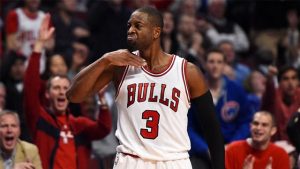 Dwyane Wade made seven 3-pointers last season.
Dwyane Wade made seven 3-pointers last season.
Seven.
That’s 21 total points — out of 1,409 — off shots from behind the arc.
The last time Wade made four 3-pointers in a game was in January 2013.
But in his first game wearing an NBA uniform that wasn’t the Miami Heat’s — the first game in the last chapter of his surefire Hall of Fame career — Wade sought and found his 3-point shot.
Wade might have said that he spent all summer in the gym, working on his long-range game, but this was unexpected.
Wade’s step-back 3-pointer in the final minute was the final dagger into the Celtics — one of four made 3-pointers in the contest — as the Bulls beat Boston 105-99 on Thursday night in Chicago.
Now, the real question for Wade, the Bulls, and the Eastern Conference — can he do it again?
It seems unlikely, but it seemed unlikely that Wade would make four 3-pointers in the first place.
It might be necessary, though.
The Celtics don’t appear to be a cohesive unit with Al Horford in the fold in Boston yet, but the Bulls fulfilled many of the expectations of the public in their first game of the regular season.
All the predictions came to light — spacing was nearly non-existent (though Boston didn’t do much to exploit the predictability of the Bulls’ drives), and the ball all-too-frequently found itself stuck to one of the Bulls’ three “Alpha Dogs” — Rajon Rondo, Jimmy Butler and Wade.
The trio shot 14-of-44 from the field, 31 percent.
It was Wade’s 4-of-6 night from behind the arc was the difference in the game.
Perhaps we should have seen this one-man 3-point revolution coming — Wade, a career 28 percent shooter from beyond the arc, made 12-of-23 3-pointers in the playoffs last season for the Heat, an improbable uptick after shooting 44 3-pointers in the entire regular season. Maybe it was a sign of things to come.
The 3-pointer is a near necessity to play 2-guard effectively in the NBA in 2016, and it’s particularly vital for the Bulls, who want to play a four-out system but already had a poor jump shooting 2-guard in Butler and had signed Rondo, a point guard who cannot shoot, 10 days before signing Wade.
A three-man backcourt without a 3-point shooter might have worked in 1988, but things have changed since then.
One of the three players would have to change, and each was more unlikely than the other.
Would the inscrutable Rondo, who is effectively on his last-chance contract in the league, change? If he could change, it probably would have happened before now.
Would Butler modify his game to accommodate his two new teammates? Should he? He’s the best of the three players at this moment, why should he take on a secondary or tertiary role?
But there was no guarantee that Wade would change his game either. The old one was pretty successful, after all.
There’s still no guarantee that any of the three will make the necessary sacrifices or adjustments to help the unit work together, but Wade’s performance Thursday night provide a taste of what a different D-Wade could provide.
It’s that kind of performance that the Bulls will need all season if they plan to make the playoffs this year and avoid a second straight lottery berth.
But old habits die hard, and it’s going to take a lot more than one game — or 15 games, to be generous and include last year’s playoffs — to prove that Wade has changed.
For the time being, things are good in Chicago. There’s plenty of work to be done with this Bulls team, but there’s some optimism, too.
And that optimism will likely last so long as the 3-pointers keep falling for No. 3.
How long will that be?
